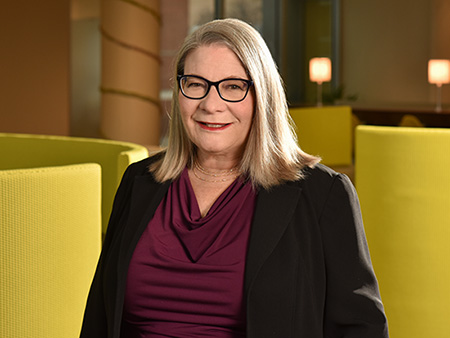Media contact: Holly Gainer
 Susanne Fogger, DNPAs the nation faces an ongoing opioid epidemic, there is a growing need for clinicians with an in-depth knowledge of opioid use disorder and other forms of addiction.
Susanne Fogger, DNPAs the nation faces an ongoing opioid epidemic, there is a growing need for clinicians with an in-depth knowledge of opioid use disorder and other forms of addiction.
To train more health care and social workers on how to identify drug abuse and treat those affected, the School of Nursing at the University of Alabama at Birmingham received a $1.13 million grant from United States Department of Health and Human Services’ Health Resources and Services Administration.
The School of Nursing will partner with the Department of Social Work in the UAB College of Arts and Sciences for the training.
The state of Alabama has seen a 300 percent increase in opioid overdose deaths in the last five years and continues to have the highest opioid prescription rate in the United States.
“The use and misuse of opioids continues to be a growing problem in Alabama and across the country, with no sign of slowing,” said School of Nursing Dean and Fay B. Ireland Endowed Chair in Nursing Doreen C. Harper, Ph.D. “Our school already leads the way in preparing professional nurses to care for rural and underserved populations, and this grant strengthens our school’s and UAB’s ability to prepare highly qualified professionals to provide care for opioid use disorder in the primary care setting. With additional didactic and clinical training for primary care nurse practitioners and social workers, UAB graduates across professions can increase preventive care and access to care for our most vulnerable residents.”
An initial cohort of 21 students, all of whom are either Master of Science, Master of Social Work or Doctor of Nursing Practice students, will receive additional training, including interprofessional learning experiences centered on prevention, early intervention and treatment of opioid use disorder. Their attention will be focused on Alabama’s vulnerable populations including children and adolescents from families affected by substance use disorders.
Students will work with several of the university’s academic-practice partnership clinics, including the 1917 Clinic, the Providing Access to Healthcare Clinic, the UAB Hospital Heart Failure Transitional Care Services for Adults Clinic, Cooper Green Mercy Health Services and the UAB Addiction Recovery Treatment Clinic as part of the grant. The clinical sites provide the students additional clinical hours atop already rigorous training, as well as the opportunity to work directly with patients with substance-related disorders in both primary care and specialized clinics.
“It is important to recognize that health care is no longer divided into silos of treatment,” said the grant’s principal investigator, Susanne Fogger, DNP. “We see a greater need for collaboration and interprofessional work in order to treat the whole patient — not just their symptoms. By connecting the two schools, we are creating the educational foundation of integrated behavioral health care where the talents of both psychiatric nurse practitioners and clinical social workers are maximized.”
The ultimate goal of the collaborative interprofessional project is to put an additional cohort of 63 psychiatric mental health nurse practitioners and social workers into Alabama’s workforce over the three-year project, strengthening the primary mental health care workforce and increasing the prevention, treatment and recovery of patients in high-need and high-demand areas.
“The nurse practitioners who graduate from the school’s PMHNP program already have training in recognizing opioid misuse and other forms of addiction, but this grant allows us to deepen that knowledge and expand their toolkits as providers,” Fogger said. “One of the biggest issues for people seeking treatment is lack of access to providers with the knowledge and skills to keep individuals in recovery. Training more nurse practitioners to treat opioid use disorder as well as other addiction is important because as many as half of the patients seen in a psychiatric practice may also have substance misuse or a substance use disorder.”
David Pollio, MSW, Ph.D., distinguished professor in the Department of Social Work, is the grant’s project coordinator. Along with Fogger, Pollio will design and implement the program plan and will supervise all social work activities.
“We are thrilled to be partnering with the School of Nursing in this important project,” Pollio said. “The Department of Social Work’s focus on health and behavioral health perfectly complements the educational and training approach in the project. We are pleased to be able to support UAB in helping address this important issue in the Birmingham community and across the state of Alabama.”